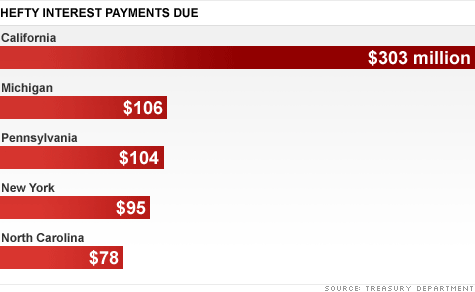
NEW YORK (CNNMoney) -- Companies have yet another reason not to boost hiring: rising unemployment taxes.
Employers around the nation are getting socked with higher state unemployment tax bills as states are forced to shell out more than $1 billion in interest payments this month. More than 30 states have had to borrow billions from a federal fund to cover unemployment benefits for their jobless residents in recent years.
And this is only the first of two tax spikes employers are contending with, on both the state and federal level. Come January, companies in 24 states could have to shell out between $21 and $63 more per employee in federal unemployment taxes.
These hikes are the latest in a series of unemployment tax increases as states look to replenish their unemployment trust funds devastated by the Great Recession.
Last year, employers paid 27.8% more in state jobless taxes, said Doug Holmes, president, UWC Strategic Services on Unemployment & Workers' Compensation, a business trade association.
"Unemployment taxes, which were a relatively low bottom-line cost in 2008, are now becoming a significant cost," Holmes said. "It discourages companies from electing to hire new employees."
This is the first time during this economic downturn that states have had to pay interest on their federal borrowing, which currently totals nearly $38 billion. The 2009 stimulus act waived interest payments for two years, giving both cash-strapped states and their employers some breathing room.
Both groups lobbied Congress last year to extend the relief for another two years, but lawmakers declined.
So states were forced this year to make some tough decisions on how to handle the interest charges at a time when they were struggling to balance their own budgets. Some dipped into other state funds or borrowed money, but most shifted the burden to employers.
New York, for instance, sent its companies a bill in mid-July requesting a lump-sum payment of up to $21.25 per employee to cover its $95.4 million interest charge due September 30.
Companies were not pleased, said Mike Durant, New York state director for the National Federation of Independent Business. For small employers, even a couple of hundred dollars in unexpected expenses can hurt, he said.
For Margery Keskin, an executive at four construction-related companies in upstate New York, the extra $2,000 her companies had to shell out means less money goes to bonuses or profit sharing for her roughly 40 employees. And she will have to think twice before she hires anyone.
"We try not to hire because we will be socked by a bigger tax bill for unemployment insurance," said Keskin.
Other states, however, have tried to spare their employers.
California, for instance, borrowed its $303.3 million interest payment from a disability insurance fund. Texas issued bonds at a lower interest rate to wipe out its balance before the interest came due. And Ohio dipped into tobacco settlement funds to settle a roughly $70 million interest bill.
"We did not want to increase the tax burden on job creators," said Ben Johnson, spokesman for Ohio's Department of Job and Family Services.
Even in states trying to shield companies, employers could see their taxes rise next year. That's because federal unemployment taxes are scheduled to go up for firms located in states that have been borrowing in recent years.
In most of these states, the 2012 federal levy will rise by $21 per worker. But that amount increases the longer the state has been borrowing. Michigan companies, for example, will have to pay $63 per employee next year.
While states have been slowly paying down their balances by hiking taxes and curtailing benefits, many are likely to have loans outstanding for years to come, experts said. That will help prompt companies' federal unemployment tax levy to soar by 89% by 2016, according to U.S. Labor Department estimates.
During the recessions of the 1970s and 1980s, it took states eight years to pay off their loans, said Rich Hobbie, executive director of the National Association of State Workforce Agencies. This go-around will be worse.
| Overnight Avg Rate | Latest | Change | Last Week |
|---|---|---|---|
| 30 yr fixed | 3.80% | 3.88% | |
| 15 yr fixed | 3.20% | 3.23% | |
| 5/1 ARM | 3.84% | 3.88% | |
| 30 yr refi | 3.82% | 3.93% | |
| 15 yr refi | 3.20% | 3.23% |
Today's featured rates:
| Latest Report | Next Update |
|---|---|
| Home prices | Aug 28 |
| Consumer confidence | Aug 28 |
| GDP | Aug 29 |
| Manufacturing (ISM) | Sept 4 |
| Jobs | Sept 7 |
| Inflation (CPI) | Sept 14 |
| Retail sales | Sept 14 |